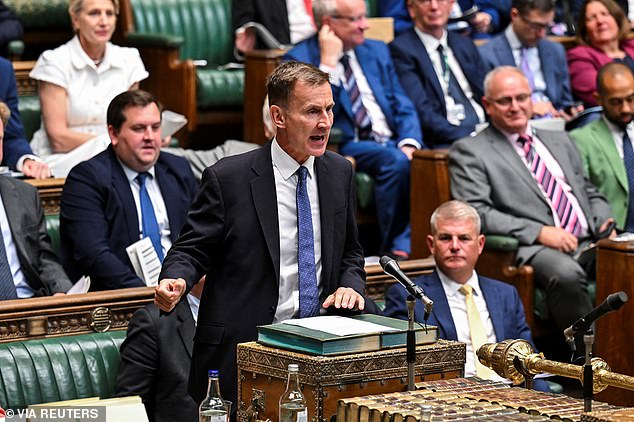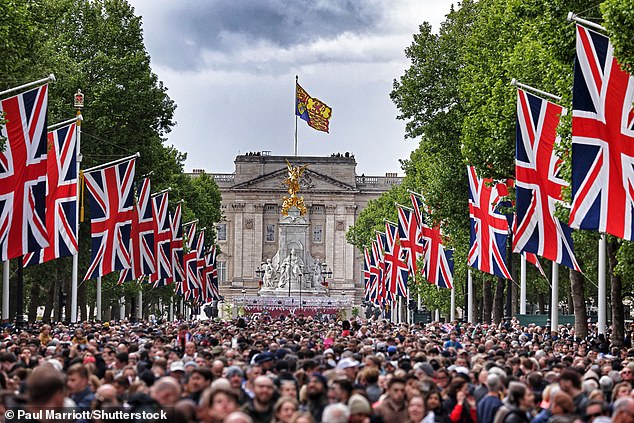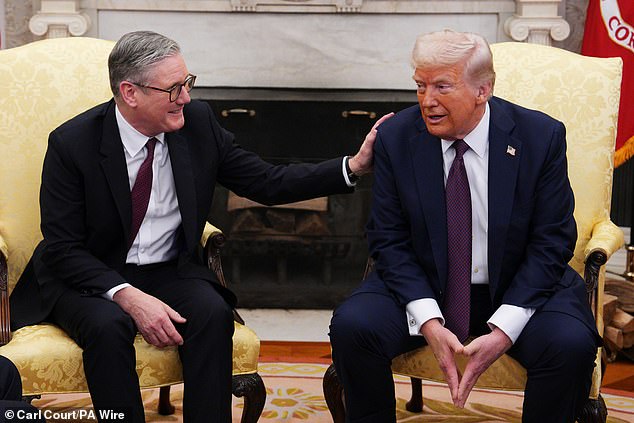- Missed yesterday’s part one in the Mail? Read it here
It was that diplomat and global thinker Henry Kissinger, a great and inspirational friend of mine, who warned the biggest pitfall for any country is self-doubt. And yet that is what we as a nation are going through. We are suffering an epidemic of self-loathing, a massive decline in self-confidence and crippling disillusionment.
More than two-thirds of the UK population now think the country is in decline. The number of people saying they are proud of Britain and its history has fallen from 86 per cent to just 64 per cent. Nearly a third of young people say they want to move abroad. Many think we are finished as a serious global player.
If you polled people in Britain today, only a minority would say playing a more active role on the global stage was a priority.
For them, being ‘great’ means better public services, higher wages and a higher standard of living.
The Brexit wars have played a part in bringing about this sorry situation. On one side, Brexiteers are disappointed that the benefits have been slower in coming than promised. On the other, unreconciled Remainers feel unable to be positive about our future outside the EU.
I have always believed that a successful Brexit is entirely possible, but by no means automatic. What we make of it depends on no one but ourselves. In the meantime, it has left many people feeling uncertain.
The political strategy of the incoming Labour government has also contributed by blaming difficult decisions on its predecessors. All incoming administrations do this but Starmer and Co went about the task with overblown relish, forgetting the real-world consequences of unrelentingly downbeat statements. That was followed by some anti-business tax rises without any accompanying plan for growth.
The result has been a vacuum, alongside a substantial decline in confidence among businesses, consumers and markets.

Former Tory Chancellor Jeremy Hunt has always believed a successful Brexit is entirely possible
So should we just give up and go home? Why don’t we just settle for being, say, Finland?
For the last eight years, Finland has come top of the World Happiness index, compiled by the United Nations, that assesses the well- being of people in different countries. It looks at health, education and living standards and asks how happy they consider themselves.
The UK doesn’t do too badly. But, while we are often ahead of other large economies, we usually lag behind some of the smaller and more prosperous European countries such as Switzerland, the Netherlands and the Nordics.
So should we just aim to be Finland? Or any other country with a higher GDP per capita, better public services and a superior overall ranking for wellbeing?
Many in Britain would like to do just that. On the Left, there is suspicion that clinging on to a military presence overseas is just a hankering for an imperial past. On the Right, there is growing isolationism.
Both are declinist about Britain’s prospects. Former Conservative cabinet minister William Waldegrave, for one, believes that we should abandon our permanent seat at the UN Security Council and accept our fate as a modest, middle-ranking country.
I fundamentally disagree with the doomsters and naysayers. National power is as much about psychology and self-perception as it is about GDP figures or military capabilities. The fact is that excessive pessimism can ultimately become a self-fulfilling prophecy.
Can Britain be great again? Most definitely. Britain’s decline is neither inevitable nor desirable. The UK just has too much to offer the world. British ambition, ingenuity and pragmatism can make us a global force for good. We have Europe’s biggest defence budget, its top universities and its most influential culture.

If we are prepared to take long-term decisions that strengthen our economy and buttress our influence, we can remain a prosperous and influential player on the world stage
In the century of AI, we have the world’s third largest technology ecosystem after the US and China. Vaccines and treatments developed in the UK saved more lives in the pandemic than those from any other country – more of which later. It’s true that we are not a superpower any more – but nor have we been relegated from the Premier League. Given what is now at stake in a world that seems more divided and dangerous than most of us can ever remember, we have a grave responsibility to exercise the influence we have wisely.
But no desire to live up to international responsibilities can duck the gritty question of how to fund them. If we want to punch above our weight in the world, we need to explain how we are going to pay for it. There is an iron link between economic strength and political influence. A strong voice needs a strong economy because without it you really are left like the Wizard of Oz hiding behind a curtain.
But I believe there is a path towards a more prosperous economy that enables us to shape the world as well as be shaped by it. We have the firepower to be a major world power alongside prosperity and decent public services at home.
If we are prepared to take long-term – and often difficult – decisions that strengthen our economy and buttress our influence, we can remain a prosperous and influential player on the world stage. A no doubt bumpy but exciting ride awaits. But if we duck those decisions, then what lies ahead is irrelevance – and possible bankruptcy.
This is not just about the choices made by our leaders. It is about each and every one of us. If we continue to wallow in the myth of inevitable decline, it will end up not being a myth.
Absorbed as we are in our own problems, it is easy to forget others face equally grave challenges. It is not just the UK that has lost its bearings. Rather, we are part of a broader crisis of confidence facing the whole of Western democracy.
US politics are more polarised than ever. The German government faces profound economic challenges. France is on its third government in a year. Far-Right parties have won elections in Italy, Austria, the Netherlands and many other European countries.
Likewise with our economic issues: our growth has stagnated and we are facing big challenges when it comes to productivity, worklessness and improving public services.

If we pull up the drawbridge others will follow suit, not least isolationists in the US
Yet we still have the sixth-largest economy in the world and are forecast to remain in that position for the next 15 years – perhaps longer.
In terms of growth, the UK is in the middle pack of large economies, not at the bottom. And, despite not being a superpower, we are nonetheless one of the top ten most influential countries on the planet – and, if you exclude autocracies, we are generally in the top five.
It is not all over for Britain – far from it. Unless we give up. But if the UK decided to emulate Finland or Switzerland, who would lead the charge on European security? Or the struggle between autocracy and democracy? Or climate change? Or reforms to reduce uncontrolled migration?
It might seem beguiling to stand back and applaud as others get their hands dirty on our behalf but, in reality, there is no ‘free rider’ option. On the contrary, if we pull up the drawbridge others will follow suit, not least isolationists in the US.
We need to step up and defend the post-Second World War global order, largely set up by the UK and the US, which has created more freedom, more scientific advancement and more prosperity than any that preceded it.
For all its flaws, liberal democracy remains the best system ever invented for human happiness, prosperity and freedom. Despite many imperfections, it is by far the most successful international order in the history of humanity.
Now is precisely the wrong moment to retreat into our shells. The more we fulfil our responsibilities, the more others will follow suit, and pressing global issues will get tackled.
And the first step we need to take is to rediscover self-belief in Britain and in other democracies whose way of life is at risk.

The first step we need to take is to rediscover self-belief in Britain and in other democracies whose way of life is at risk. Jeremy Hunt with Ukrainian president Volodymyr Zelensky
We should not allow self-doubt to cloud the reality that liberal democracies remain a vastly superior way to unleash human potential than, for example, China’s surveillance state.
But until we start to make the case for liberal democracy more effectively, the overall picture will continue to slide in the wrong direction. The number of countries considered democratic by the US think-tank Freedom House is falling, with the number classified as ‘free’ declining nearly every year over the last decade.
Only a fifth of the world’s population now live fully in freedom. Between them, the large and wealthy democracies account for half the world’s military strength and half the world’s GDP. When we operate individually, we can be picked off. But when we work together – generally with the UK at the front of the pack – our shared commitment to freedom and democracy can become an unbreakable bond.
That is greatly underestimated by our opponents. We should not underestimate it ourselves. But it won’t happen unless Europe, led by the UK, finally starts to pull its weight on defence. Donald Trump has a point. None of us is spending anything like the 3.4 per cent of GDP being spent by America on defence. And we should not be surprised that over 40 per cent of Americans believe the US should stay out of world affairs.
Our armed forces remain a source of great national pride. But with multiple economic challenges, can we afford to increase defence spending in the way we need to? A big increase in European defence spending is Trump’s price for staying in Nato – with an even bigger one necessary if he does not.
This is an extremely dangerous moment for European security. Anyone who thinks that, since Brexit, the UK has become a minor and somewhat irrelevant power could not be more wrong: we are pivotal to what happens next. With a strategic approach to increased defence spending, we can reduce its cost to the economy by unlocking longer-term growth. And with effective diplomacy we can bring our European Nato allies with us in a way that keeps the US at the heart of the alliance.
Economically too, we should not underestimate the clout we have. Like other countries, we’ve had to cope with ‘black swan’ events such as a global financial crisis, a pandemic and an energy shock.
But our economy remains one of the most open and innovative of any large country.
Whether on security, democracy, migration, trade, climate change, human rights, health or technology, we have a lot to contribute to global solutions.
Our governments – including ones in which I served – have made many mistakes.
But our democracy is no more flawed than others, and more healthy than many.
The UK media is the fourth free-est (behind Germany, Canada and France) in the G20 and the country is in the top ten globally for internet freedom. Perceptions of corruption are the fifth lowest. Compared to our peers, the UK remains one of the free-est and least corrupt countries on Earth.
We face the same demographic pressures and rising expectations as many other countries. But with its extraordinary science and technology base, Britain can make the exercise of global responsibilities a source of prosperity.
Whether on security, democracy, migration, trade, climate change, human rights, health or technology, we have a lot to contribute to global solutions.
In a dangerous world, it is time to swap lazy declinism with a proper understanding of the extent and source of our global influence. If Britain wants to be a force for good, we have much to bring to the table.
Adapted from Can We be Great Again? by Jeremy Hunt (Swift Press, £20), to be published June 5. © Jeremy Hunt 2025. To order a copy for £22.50 (offer valid to 07/06/25; UK P&P free on offers over £25) go to www.mailshop.co.uk/books or call 020 3176 2937.













